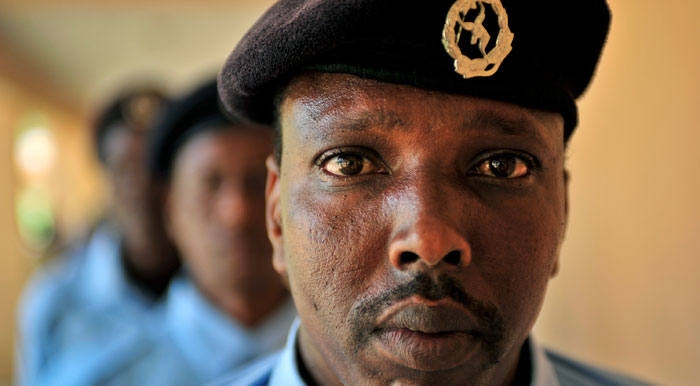
Officers of the Somali national police force, October 15, 2012 in Mogadishu, Somalia. UN Photo/Tobin Jones
The new Somali government represents the best chance in 20 years to rebuild the state. Eight years since an agreement to replace the Transitional Federal Government, Somali political leaders and civil society actors have established a new government headed by civil rights activist Hassan Sheikh Muhamed under a new provisional constitution.
The challenges ahead were the topic of an October 19th roundtable at IPI with Professor Ken Menkhaus from Davidson College and Sam Bassey Ibok, Director ad interim of the Africa I Division in the UN Department of Political Affairs.
Both speakers highlighted the new opportunity for Somalia, noting that the Somali population has welcomed the new government. The speakers gave credit to the United Nations, African Union, and European Union, notwithstanding various mistakes and shortcomings in the rushed international planning for the election.
Here are some of the key takeaways from the meeting: ,p>1. The Somali people finally have a meaningful alternative to the control of al-Shabaab, and there is a new relationship of trust between the business community and civil society.
2. Hostile neighbors that could destabilize the new government are now absent. Kenya and Ethiopia support the changes underway.
3. Al-Shabaab remains a serious security concern, particularly in Puntland and Somaliland. But the government cannot rely on its army or police. Political violence is likely to continue, and the defeat of piracy at sea is leading to more criminal activity on land.
4. Although the immediate post-election challenge is to provide basic needs and services, there is no money to pay the salaries of the army, police, or civil service.
5. Expanding government authority to spaces liberated from al-Shabaab will take time and resources. The rearguard battle against the new government from those who lost the election will not help.
6. The UN is currently conducting a strategic review to ensure greater multilateral coordination and effective interaction with the new government. It is cognizant of the government’s desire for ownership of next steps and not to be overloaded by international demands.
7. As refugees return to their homes, the AMISOM peacekeeping mission will have to shift its focus from fighting al-Shabaab to negotiating local disputes over land.
8. The UN wants to set the stage for the further fulfillment of the Roadmap for the End of Transition, leading to a new referendum on a permanent government by 2016. To this end, complex issues will need to be addressed, including federalism and the role of Sharia law.







